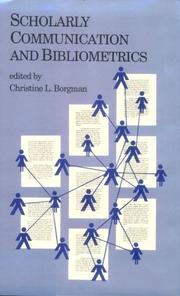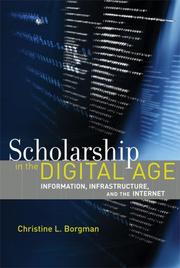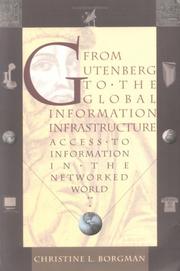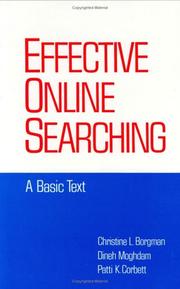| Listing 1 - 10 of 11 | << page >> |
Sort by
|
Book
ISBN: 9780262028561 9780262327862 0262327864 0262529912 9780262529914 0262028565 9780262327879 0262327872 Year: 2015 Publisher: Cambridge (Mass.): MIT Press,
Abstract | Keywords | Export | Availability | Bookmark
 Loading...
Loading...Choose an application
- Reference Manager
- EndNote
- RefWorks (Direct export to RefWorks)
"Big Data" is on the covers of Science, Nature, the Economist, and Wired magazines, on the front pages of the Wall Street Journal and the New York Times. But despite the media hyperbole, as Christine Borgman points out in this examination of data and scholarly research, having the right data is usually better than having more data; little data can be just as valuable as big data. In many cases, there are no data -- because relevant data don't exist, cannot be found, or are not available. Moreover, data sharing is difficult, incentives to do so are minimal, and data practices vary widely across disciplines. Borgman, an often-cited authority on scholarly communication, argues that data have no value or meaning in isolation; they exist within a knowledge infrastructure -- an ecology of people, practices, technologies, institutions, material objects, and relationships. After laying out the premises of her investigation -- six "provocations" meant to inspire discussion about the uses of data in scholarship -- Borgman offers case studies of data practices in the sciences, the social sciences, and the humanities, and then considers the implications of her findings for scholarly practice and research policy. To manage and exploit data over the long term, Borgman argues, requires massive investment in knowledge infrastructures; at stake is the future of scholarship.
Information retrieval --- Information systems --- Communication in learning and scholarship --- Research --- Information technology. --- Information storage and retrieval systems. --- Cyberinfrastructure --- Communication savante --- Recherche --- Technologie de l'information --- Systèmes d'information --- Technological innovations. --- Methodology. --- Data processing. --- Innovations --- Méthodologie --- Informatique --- Cyberinfrastructure. --- Information technology --- Information storage and retrieval systems --- Technological innovations --- Methodology --- Data processing --- Systèmes d'information --- Méthodologie --- Cyber-based information systems --- Cyber-infrastructure --- Electronic data processing --- Computer networks --- Computer systems --- Distributed databases --- High performance computing --- Automatic data storage --- Automatic information retrieval --- Automation in documentation --- Computer-based information systems --- Data processing systems --- Data storage and retrieval systems --- Discovery systems, Information --- Information discovery systems --- Information processing systems --- Information retrieval systems --- Machine data storage and retrieval --- Mechanized information storage and retrieval systems --- Electronic information resources --- Data libraries --- Digital libraries --- Information organization --- IT (Information technology) --- Technology --- Telematics --- Information superhighway --- Knowledge management --- Electronic data processing in research --- Communication in scholarship --- Scholarly communication --- Learning and scholarship --- Distributed processing --- Store datamengder --- Informasjonsteknologi --- Datautvinning --- Forskningsmetoder --- Cyberspace --- INFORMATION SCIENCE/Technology & Policy --- INFORMATION SCIENCE/Internet Studies --- INFORMATION SCIENCE/General --- Data centers --- Communication in learning and scholarship - Technological innovations --- Research - Methodology --- Research - Data processing

ISBN: 0803938799 Year: 1990 Publisher: Newbury Park Sage Publications
Abstract | Keywords | Export | Availability | Bookmark
 Loading...
Loading...Choose an application
- Reference Manager
- EndNote
- RefWorks (Direct export to RefWorks)
Science --- Library research --- Bibliometrics --- Bibliometrie --- Bibliométrie --- Eruditie --- Erudition --- Learning and scholarship --- Savoir et érudition --- 02:51 --- 001.83 --- Communication --- -Communication in learning and scholarship --- Communication in scholarship --- Scholarly communication --- Communication, Primitive --- Mass communication --- Sociology --- Bibliography --- Statistical bibliography --- Intellectuele samenwerking, wetenschappelijke communicatie --- Research --- -Methodology --- Statistical methods --- 001.83 Intellectuele samenwerking, wetenschappelijke communicatie --- 02:51 Bibliometrie --- Communication in learning and scholarship --- Research&delete& --- Methodology --- Communication - Research - Methodology. --- Bibliometrics. --- Learning and scholarship.

ISBN: 1282096125 9786612096129 0262255782 1435605993 9780262255783 9780262026192 9781435605992 0262026198 9781282096127 6612096128 0262250667 Year: 2007 Publisher: Cambridge, Mass. MIT Press
Abstract | Keywords | Export | Availability | Bookmark
 Loading...
Loading...Choose an application
- Reference Manager
- EndNote
- RefWorks (Direct export to RefWorks)
Scholars in all fields now have access to an unprecedented wealth of online information, tools, and services. The Internet lies at the core of an information infrastructure for distributed, data-intensive, and collaborative research. Although much attention has been paid to the new technologies making this possible, from digitized books to sensor networks, it is the underlying social and policy changes that will have the most lasting effect on the scholarly enterprise. In Scholarship in the Digital Age, Christine Borgman explores the technical, social, legal, and economic aspects of the kind of infrastructure that we should be building for scholarly research in the twenty-first century. Borgman describes the roles that information technology plays at every stage in the life cycle of a research project and contrasts these new capabilities with the relatively stable system of scholarly communication, which remains based on publishing in journals, books, and conference proceedings. No framework for the impending "data deluge" exists comparable to that for publishing. Analyzing scholarly practices in the sciences, social sciences, and humanities, Borgman compares each discipline's approach to infrastructure issues. In the process, she challenges the many stakeholders in the scholarly infrastructure--scholars, publishers, libraries, funding agencies, and others--to look beyond their own domains to address the interaction of technical, legal, economic, social, political, and disciplinary concerns. Scholarship in the Digital Age will provoke a stimulating conversation among all who depend on a rich and robust scholarly environment. Christine L. Borgman is Professor and Presidential Chair in Information Studies at the University of California, Los Angeles. She is the author of From Gutenberg to the Global Information Infrastructure: Access to Information in the Networked World (MIT Press, 2000).
Communication in learning and scholarship --- Scholarly electronic publishing. --- Information technology. --- Learning and scholarship --- Technological innovations. --- Social aspects. --- Erudition --- Scholarship --- IT (Information technology) --- Electronic scholarly publishing --- Communication in scholarship --- Scholarly communication --- Electronic publishing --- Civilization --- Intellectual life --- Education --- Learned institutions and societies --- Research --- Scholars --- Technology --- Telematics --- Information superhighway --- Knowledge management --- Scholarly publishing --- Electronic books --- INFORMATION SCIENCE/General
Book
ISBN: 9791036565410 9791036550386 Year: 2020 Publisher: Marseille : OpenEdition Press,
Abstract | Keywords | Export | Availability | Bookmark
 Loading...
Loading...Choose an application
- Reference Manager
- EndNote
- RefWorks (Direct export to RefWorks)
Puisant ses analyses et ses exemples dans des champs scientifiques variés, cet ouvrage (dont l’original est paru en 2015 chez MIT Press) offre une étude inédite des utilisations des données au sein des infrastructures de la connaissance – utilisations qui varient largement d’une discipline à l’autre. Bien que le big data ait régulièrement les honneurs de la presse des deux côtés de l’Atlantique, Christine L. Borgman met en évidence qu’il vaut mieux disposer des bonnes données qu’en avoir beaucoup. Elle montre également que les little data peuvent s’avérer aussi précieuses que les big data, et, que, dans bien des cas, il n’y a aucune donnée, parce que les informations pertinentes n’existent pas, sont introuvables ou sont indisponibles… Au travers d’études de cas pratiques issus d’horizons divers, Christine L. Borgman met aussi en lumière que les données n’ont ni valeur ni signification isolément : elles s’inscrivent au sein d’une infrastructure de la connaissance, c’est-à-dire d’un écosystème de personnes, de pratiques, de technologies, d’institutions, d’objets matériels et de relations. Pour l’autrice, gérer les données et les exploiter sur le long terme requiert ainsi des investissements massifs dans ces infrastructures de la connaissance. L’avenir de la recherche, dans un monde en réseau, en dépend.
Information Science & Library Science --- données --- big data --- recherche --- infrastructure de la connaissance
Book
ISBN: 9780262514903 Year: 2010 Publisher: Cambridge (Mass.) MIT Press
Abstract | Keywords | Export | Availability | Bookmark
 Loading...
Loading...Choose an application
- Reference Manager
- EndNote
- RefWorks (Direct export to RefWorks)

ISBN: 9780262255776 0585263817 9780585263816 0262255774 9780262523455 0262250284 1282096117 026202473X 9780262024730 0262523450 Year: 2003
Abstract | Keywords | Export | Availability | Bookmark
 Loading...
Loading...Choose an application
- Reference Manager
- EndNote
- RefWorks (Direct export to RefWorks)
Information superhighway. --- Digital libraries. --- Libraries --- Information superhighway --- Digital libraries --- Special collections --- Electronic information resources. --- Documentation and information --- Social change --- Mass communications --- Computer. Automation --- Information retrieval --- Computer architecture. Operating systems --- United States --- 002:62 --- 026.068 --- Data highway --- Data superhighway --- Digital highway --- Electronic superhighway --- Global information infrastructure --- I-way (Information superhighway) --- Infobahn --- Infopike --- Information highway --- Information infrastructure --- Infrastructure, Information --- National information infrastructure --- Superhighway, Information --- Information networks --- Information society --- Information technology --- 026.068 Software, programmatuur. Elektronische informatiebronnen. Digitale bibliotheken. Virtuele bibliotheken --- Software, programmatuur. Elektronische informatiebronnen. Digitale bibliotheken. Virtuele bibliotheken --- 002:62 Informatietechnologie --- Informatietechnologie --- Documentation --- Public institutions --- Librarians --- Digital curation --- Digital media collections --- Digital media libraries --- Digital repositories --- Electronic libraries --- Electronic publication collections --- Electronic publication libraries --- Electronic text collections --- Repositories, Digital --- Virtual libraries --- Information storage and retrieval systems --- Web archives --- Special collections&delete& --- Electronic information resources --- AA / International- internationaal --- 020 --- Bibliotheekwezen: algemeenheden. --- Bibliotheekwezen: algemeenheden --- Social Sciences --- Library & Information Science --- United States of America --- Bibliothèques --- Sources d'information électroniques --- Bibliothèques virtuelles --- Autoroutes de l'information --- Information électronique --- États-Unis --- Fonds spéciaux --- Bibliothèques --- Sources d'information électroniques --- Bibliothèques virtuelles --- Information électronique --- États-Unis --- Fonds spéciaux
Book
Abstract | Keywords | Export | Availability | Bookmark
 Loading...
Loading...Choose an application
- Reference Manager
- EndNote
- RefWorks (Direct export to RefWorks)
Book
Year: 1979 Publisher: New York, NY : Association for Computing Machinery,
Abstract | Keywords | Export | Availability | Bookmark
 Loading...
Loading...Choose an application
- Reference Manager
- EndNote
- RefWorks (Direct export to RefWorks)
The theme of this conference - Information Implications into the Eighties - has brought forth papers on a wide variety of topics, but all point to the inescapable conclusion of an explosion of information management problems and opportunities. Movement is occurring in many directions - toward large networks and simultaneously toward personal systems. The Eighties will bring challenges to long-held ideas such as how the modern office does its paperwork (or whether it should use paper at all). These and other problems will provide exciting opportunities for real progress.ACM-SIGIR scheduled this conference in conjunction with the meeting September 28 and 29, 1979, of the Texas Chapter of the American Society for Information Science entitled, "Microcomputers and Information Processing." The Panel Discussion, "Information Implications into the Eighties," was sponsored by both organizations and served as the closing session of the ACM-SIGIR conference and the opening session of the Texas ASIS conference.

ISBN: 0824771427 Year: 1984 Publisher: New York M. Dekker
Abstract | Keywords | Export | Availability | Bookmark
 Loading...
Loading...Choose an application
- Reference Manager
- EndNote
- RefWorks (Direct export to RefWorks)
Information retrieval --- Information retrieval. --- Online bibliographic searching --- On-line bibliographic searching --- Electronic information resource searching --- Searching, Bibliographical --- Data retrieval --- Data storage --- Discovery, Information --- Information discovery --- Information storage and retrieval --- Retrieval of information --- Documentation --- Information science --- Information storage and retrieval systems --- On-line bibliographic searching.
Book
Year: 2001 Publisher: [Place of publication not identified] : ACM ;
Abstract | Keywords | Export | Availability | Bookmark
 Loading...
Loading...Choose an application
- Reference Manager
- EndNote
- RefWorks (Direct export to RefWorks)
| Listing 1 - 10 of 11 | << page >> |
Sort by
|

 Search
Search Feedback
Feedback About UniCat
About UniCat  Help
Help News
News